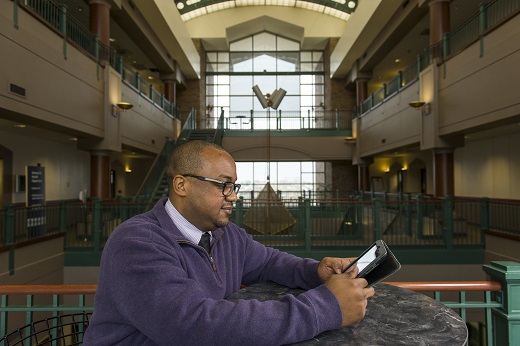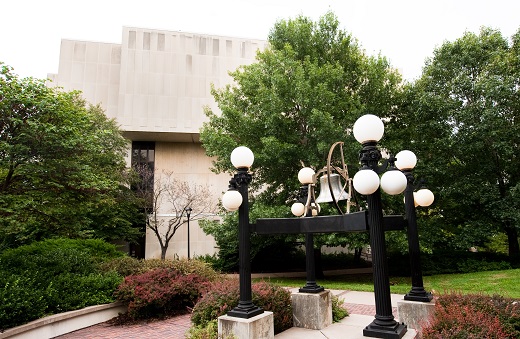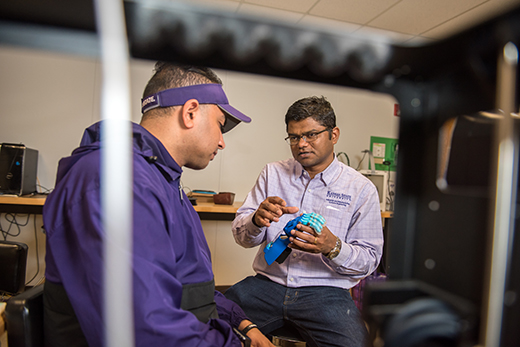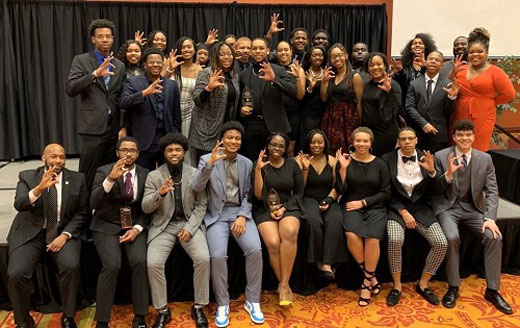03/04/20
K-State Current - March 4, 2020
K-State Current is a weekly news update for the Kansas Board of Regents to apprise the Regents on a few of the many successes and achievements made by K-State faculty, staff and students.
K-State News
University licenses technology for coronavirus and norovirus compounds
 Amid increasing worldwide concern about a novel coronavirus, COVID-19, Kansas State University has licensed a technology that may lead to the production of an antiviral drug to treat coronaviruses and noroviruses.
Amid increasing worldwide concern about a novel coronavirus, COVID-19, Kansas State University has licensed a technology that may lead to the production of an antiviral drug to treat coronaviruses and noroviruses.
Yungeong Kim and Kyeong-Ok "KC" Chang, virologists in the K-State College of Veterinary Medicine, and William Groutas, a medicinal chemist at Wichita State University, have been using National Institutes of Health grants to work on human norovirus therapeutics and recently received an additional $3.7 million grant to develop antiviral drugs to treat Middle East Respiratory Syndrome, better known as MERS human coronavirus. Their work extends to other human viruses that have a similar viral protease, such as rhinoviruses and the newly emerged human coronavirus, COVID-19.
No antiviral drugs are yet available for human norovirus or coronaviruses, which include SARS, MERS and COVID19.
This could change as a result of a new license agreement between K-State and Cocrystal Pharma Inc., a clinical stage biotechnology company that is discovering and developing novel antiviral therapeutics to further develop certain proprietary broad-spectrum antiviral compounds for the treatment of norovirus and coronavirus infections.
Cocrystal has been granted an exclusive license to certain antiviral compounds developed by Kim, Chang and Groutas. The company intends to pursue research and development of theses antiviral compounds, including preclinical and clinical development.
"This licensing agreement provides support to confront the emerging strain of coronavirus with urgency and caution," said Bonnie Rush, dean of the College of Veterinary Medicine at K-State. "The work of our K-State researchers is tremendously challenging and has never been more timely."
Rush said Chang and Kim have collaborated for years on the development of antiviral compounds to combat devastating viral diseases of humans and animals.
Similar to coronaviruses, human norovirus is a major pathogen with 10-21 million cases each year in the U.S. alone. The virus causes gastroenteritis and is also a potential bioterrorism agent because of its ability to cause debilitating illness.
"Our protease inhibitors target a virus protein called 3C or 3C-like proteases, which are essential for virus replication," Kim said. "Other antiviral drugs that have a similar mechanism are HIV protease inhibitors and hepatitis C virus protease inhibitors, but these do not work well against coronavirus."
The licensing agreement was coordinated by K-State Innovation Partners, formerly known as the Kansas State University Research Foundation.
"The team at Cocrystal Pharma moved with a high sense of urgency to finalize the license negotiations," said Bret Ford, director of business development and licensing at Innovation Partners. "We look forward to watching them move with the same sense of urgency to advance our antiviral compounds toward human clinical trials."
This license agreement with K-State advances the company's antiviral programs significantly by providing potent compounds for further development.
"We are incredibly pleased to contract with the Kansas State University Research Foundation as we seek to develop safe and effective antiviral therapies for these viruses," said Sam Lee, president of Cocrystal. "This license agreement opens several development opportunities for us to expand the broad utility of our platform to address significant viruses for which there are unmet medical needs, particularly the COVID-19 coronavirus and norovirus."
The focus of research for Kim, Chang and Groutas has been on human viruses. However, some very important discoveries related to animal viruses such as feline coronavirus have also resulted from their research.
"We were able to utilize our knowledge and resources to develop a protease inhibitor for this animal viral disease along the way," Kim said. "It is very encouraging for this suggests that we are on the right track for our approach and also that we can contribute to improving animal health."
Online degree programs rise in latest U.S. News & World Report rankings
 In its latest set of annual college rankings released in January, U.S. News & World Report recognized Kansas State University's online portfolio of programs for excellence in 11 categories for 2020.
In its latest set of annual college rankings released in January, U.S. News & World Report recognized Kansas State University's online portfolio of programs for excellence in 11 categories for 2020.
K-State's individual online programs that were ranked included the Professional MBA and the Master of Software Engineering, while its master's degrees in education and engineering, as well as all of its bachelor's degrees, received group rankings.
"K-State's continued presence and rise in these rankings help facilitate our future students' connection with us," said Karen Pedersen, dean of Global Campus. "We're proud to partner with K-State's expert faculty to continue refining and improving the online learning experience."
In addition to the overall rankings provided by U.S. News & World Report, the publication also ranked the top online programs for veterans, and K-State's eligible programs fared even better in those categories.
As an institution, K-State was ranked No. 58 for its online bachelor's degree offerings overall and No. 39 for bachelor's degrees for veterans. With new programs being added each year, the institution currently offers 13 bachelor's degrees online.
K-State also has a number of online graduate programs ranked among the top 50 in the country.
The university continues to rank highly for engineering online graduate degree programs, coming in at No. 38 overall and No. 22 among top programs for veterans in 2020. The graduate engineering programs include mechanical, electrical, chemical, civil, software and nuclear engineering, and engineering management and operations research.
Among individual engineering programs, the university's Master of Software Engineering was ranked No. 28 for 2020.
K-State's online master's degrees in education were ranked No. 42 overall, No. 22 among best educational administration programs, and No. 14 in education programs for veterans. Online education master's degrees include academic advising, adult learning and leadership, curriculum and instruction, and the Master of Arts in teaching.
In the College of Business Administration, the Professional Master of Business Administration, or PMBA, ranked No. 25 in the U.S. News & World Report listing among top MBAs, as well as No. 19 for veterans and No. 11 among top online MBA programs with a management focus.
In creating its rankings, U.S. News & World Report analyzes program effectiveness in a variety of ways, including student engagement, admissions selectivity, peer reputation, faculty credentials and training, and student services and technology.
For information about online degree programs offered visit online.k-state.edu.
College of Education shares innovative teaching strategies with Chapman teachers
 Four College of Education faculty members traveled to Chapman in late January to provide professional learning sessions for the district's middle and high school teachers.
Four College of Education faculty members traveled to Chapman in late January to provide professional learning sessions for the district's middle and high school teachers.
Sessions for Chapman's middle and high school teachers we led by James Alberto, instructor of curriculum and instruction-science; Brad Burenheide, associate professor of curriculum and instruction-social studies; Angie Messer, instructor of curriculum and instruction; and Suzanne Porath, assistant professor of curriculum and instruction-English.
Mary Wright, Chapman Middle School principal, coordinated the sessions, which addressed various teaching strategies, engaging activities and modeling interactive learning pedagogy. The educators evaluated language used in math questioning and analyzed assessments using the depth of knowledge level rubrics. Social studies teachers focused on historical inquiry, the art of making history come to life, while English teachers worked with #BookSnaps and science teachers created a video using #FlipGrid.
Wright said the middle school teachers appreciated the opportunity to collaborate.
"The teachers enjoyed having time to implement new strategies and the help they received from K-State faculty as they created new lessons and materials for their classrooms," Wright said. "They also really appreciated working with high school math teachers because it allowed them to discuss different methods and learn new methods to better prepare the kids for high school."
Kevin Suther, Chapman High School principal, said the Chapman High School staff was excited, rejuvenated and filled with new ideas after going through training with the K-State faculty.
"It was a chance to have direct, content-specific information for all of our core teachers to learn about strategies, collaborate on future projects and bring in new approaches to education," Suther said. "I want to truly thank them for taking the time to help our staff grow."
K-State Faculty Highlights
Engineering professor to lead US and UK teams as part of NSF-funded research involving phosphorous levels in soils
 A project led by a Kansas State University engineering professor and funded by the National Science Foundation through its program Signals in the Soil, United Kingdom Research and Innovation, is expected to strengthen national and economic security of both the U.S. and the U.K. by addressing global challenges of sustainable food production and regulation of fertilizer application.
A project led by a Kansas State University engineering professor and funded by the National Science Foundation through its program Signals in the Soil, United Kingdom Research and Innovation, is expected to strengthen national and economic security of both the U.S. and the U.K. by addressing global challenges of sustainable food production and regulation of fertilizer application.
Suprem Das, assistant professor of industrial and manufacturing systems engineering and a David and Lynda Dawson — Carl and Mary Ice Keystone research scholar, will spearhead efforts toward "Real-Time and Continuous Monitoring of Phosphates in the Soil with Graphene-based Printed Sensor Arrays."
The collaboration will include faculty members Saugata Datta, University of Texas, San Antonio; Biswajit Ray, University of Alabama, Huntsville; and Adrien Chauvet, Natalia Martsinovich and Duncan Cameron, all from the University of Sheffield in the U.K.
The goal of the three-year research project, supported by $799,950 in funding in the U.S., and a total of nearly $1.7 million in both countries, is to develop and use a graphene-based additive manufacturing technology to design a low-cost sensor for real-time monitoring of phosphorus content in soil.
"Phosphorous, one of most important nutrients in soil, is required for plant growth and is an indicator of soil health," Das said. "It is important to understand the variations of phosphate in soils and soil-water systems when addressing sustainable food production and regulating fertilizer applications for crops grown in various soil conditions and climate regimes."
The team will develop new graphene soil-sensor technology that will continuously and wirelessly monitor soil phosphates in U.S. Midwest soils and U.K. East Midlands soils.
"Our work will benefit both the U.S. and U.K. as it vitalizes the future workforce by bridging the gaps between science, technology, agriculture and environmental disciplines," Das said.
The project will propel interdisciplinary research at both Kansas State University and the Carl R. Ice College of Engineering in areas such as advanced manufacturing, advanced materials, and sensors for agriculture and environment, while training and educating graduate and undergraduate students as well as postdoctoral researchers.
K-State Student News
K-State's Black Student Union wins Outstanding Big XII Council of the Year
 Kansas State University's Black Student Union has been awarded the Clarence Wine Award for Outstanding Big XII Council of the Year for the 12th time in 15 years.
Kansas State University's Black Student Union has been awarded the Clarence Wine Award for Outstanding Big XII Council of the Year for the 12th time in 15 years.
The Black Student Union, or BSU, received the award at the 43rd annual Big XII Conference on Black Student Government Feb. 20-23 at the University of Oklahoma.
Also during the conference, Del'Sha Roberts, senior in biology, Kansas City, received the Mordean Taylor-Archer Most Outstanding Executive Council Member of the Year Award. Roberts served as the chair to the Big XII Council on Black Student Government for the 2019-2020 year.
Three other K-State students were elected to serve on the Big XII Council on Black Student Government for the 2020-2021 year. Isaac Smallwood, junior in social sciences, Bel Aire, was elected as the assistant treasurer. Smallwood will automatically become the treasurer for the council for the 2021-2022 year. India Barnett, sophomore in biomedical engineering, Kansas City, was elected as a co-chair for the Conference Management Committee. Johari Snell, junior in food science and industry, Kansas City, Missouri, was elected as secretary.
"The repeated recognition over the years reflects consistent strong leadership including that from the most recent president Kemondre Taylor," said Trumanue Lindsey, director of diversity and multicultural student life. "Please help me in congratulating this group for their dedication to campus and the community."
K-State's BSU will host the 44th annual Big XII Conference on Black Student Government in February 2021.